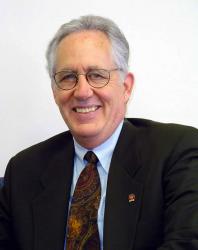Fulbright experience a love affair for communication studies professor
A Fulbright award allowed John Pollock to travel last spring to the University of Belgrano in Buenos Aires, where he taught classes and conducted research on society’s impact on media. While there, he discovered a society and culture that mesmerized him.


After John C. Pollock, professor and chair of communication studies, returned from four months of teaching and conducting research in Argentina, he was surprised to receive emails in English from people he had met. Previously, they interacted with him in Spanish.
“Everybody stayed in Spanish and they knew I wanted to do my lectures in Spanish,” Pollock recalled.
“I had no idea. And their English, of course, was far, far better than my Spanish.… But they had been too polite, their manners were so beautiful, that they sort of didn’t let me know that. They stayed in Spanish.”
Such experiences explain why Pollock was mesmerized by Argentinian people and culture while he spent March to June in Buenos Aires as a Fulbright Scholar at the University of Belgrano. Since its inception in 1946, the Fulbright Program has provided grants to almost 300,000 national or foreign participants—chosen for their academic merit and leadership skills—with the opportunity to study, teach, and conduct research abroad, and to increase a mutual understanding between people of different countries. The U.S. Department of State funds the program.
“It stretches you as a teacher and a colleague and as a scholar in multiple ways,” said Morton Winston, professor and chair of philosophy and religion, who was on Fulbright grants in South Africa in 1991, Thailand in 1999–2000, and Denmark in 2007.
“Generally speaking, Fulbrighters do teaching at the host institution, they may develop some new courses or curriculum for their host institution,” Winston said. “They usually give a number of public lectures or workshops in their area at the host institution, and they serve as sort of cultural ambassadors for the United States. The idea of the Fulbright program, of course, is person-to-person diplomacy.”
During his time in Argentina, Pollock taught and researched society’s impact on media, linking social inequality in demographic structures of cities or nation-states to coverage of critical issues. He taught Argentinian students, many of whom are part time, to write professional-level papers and conduct cross-national research. Topics included media coverage of how water is stored and allocated, and how minors who have immunity from prosecution get recruited by drug lords.

“I call it a community structure approach,” said Pollock, who joined TCNJ’s faculty in 1992. “Instead of asking the traditional questions about the impact of media on society, I asked questions about the impact of society on media.”
Pollock discussed his theories of community structure on an Argentinian television program and was videotaped so other teachers and students could learn his approaches. He also co-authored three papers in journals.
Accustomed to treating students like colleagues, which he learned from professors as an undergraduate at Swarthmore College and during his doctoral studies at Stanford University, Pollock has a personal style of teaching. “I will go into dance routines; I will sing; I will do what it takes to bring something alive,” he said.
Pollock, whose original field was Latin American politics and previously conducted research in Colombia, was concerned he might encounter anti-Americanism in Argentina. Ironically, he wound up feeling more respected than ever before.
“I actually found a great deal of admiration (from people),” he said. “One of the things that they admire about us is apparently our ability … to disagree, but then at the end of the day, compromise and work in teams to actually accomplish substantial things.”
In addition to his work as a scholar, Pollock embraced the salubrious rhythm of Argentian life. It is more relaxed and oriented around family and friends than that in the United States. And the steaks, wine, and coffee—oh, how he still savors the steaks, wine, and coffee.
“The way I like to think about Argentina, and particularly Buenos Aires, it has the architecture of Paris, it has the climate of California, it has the cuisine of Italy and Spain, and the prices of South Dakota,” Pollock said with a smile.
After returning to TCNJ, Pollock’s best lecture materials were in Spanish, so he had to translate them back into English. He quickly learned through e-mails that some new friends could have read either version.
Click on any image below to view it larger.
Posted on October 6, 2010


